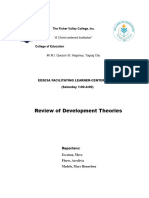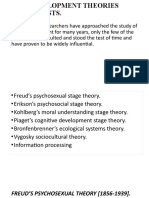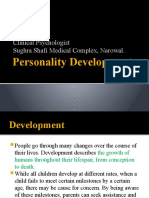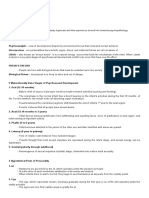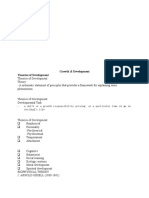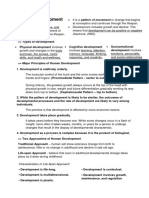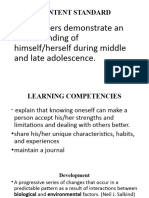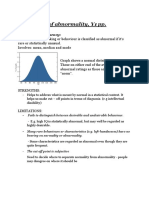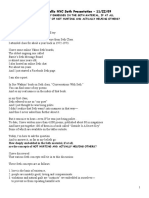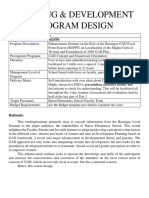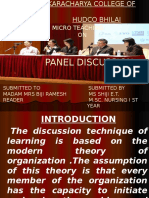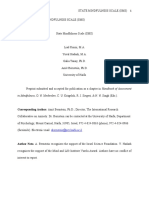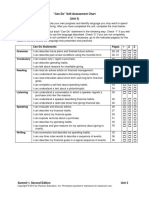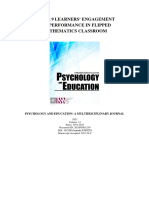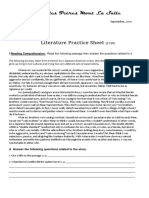Reviewer 201 • Abstract reasoning
• Metacognition – ability to reflect upon one's thinking.
PIAGET’S COGNITIVE DEVELOPMENT THEORY
• scientific reasoning
JEAN PIAGET Erickson’s Psychosocial Development
•Piaget developed a theory of cognitive •Erik Homburger Erikson was born Erik Salomonsen on
development by observing his own children's June 15, 1902, near Frankfurt, Germany. His young Jewish
behavior on certain tasks during infancy and mother, Karla Abrahamsen, raised Erik by herself for a
time before marrying a physician, Dr. Theodore
childhood. Piaget specified four major periods Homberger. The fact that Homberger was not his
corresponding to different ages of the biological father was concealed from Erikson for many
developing child. (Lerner, 2003) years. When he finally did learn the truth, Erikson was left
with a feeling of confusion about who he really was
Theory of Cognitive Development
Stage of Psychosocial Development
• SCHEMA -an assumption that an individual has of the
self, others or the world; building blocks of knowledge. Stage 1 - Trust vs. Mistrust(Birth to 1 year old)
As infants, we enter the first stage that Erikson called Basic
ASSIMILATION - It is the process by which we incorporate Trust vs. Mistrust. We ask ourselves if we can trust the
new information into existing schemas. world and we wonder if it’s safe. We learn that if we can
trust someone now, we can also trust others in the future.
If we experience fear, we develop doubt and mistrust. The
Ex: A child may call the striped animal they see at the zoo a key to our development is our mother.
horse rather than a zebra.
ACCOMMODATION-In accommodation, new information Stage 2 - Autonomy vs. Shame and Doubt(1 year old to 3
or experiences cause you to modify your existing schemas years old)
-If children are encouraged and supported in their
increased independence, they become more confident and
Ex: The mother will say, “No, honey, that's a zebra, not a secure in their own ability to survive in the world.If
horse." children are criticized, overly controlled, or not given the
opportunity to assert themselves, this may lead to over
• Equilibrium -It is the process of balancing assimilation dependence upon others, lack self-esteem, and feel a
and accommodation to create schemes that fit the sense of shame or doubt in their abilities.
environment.
Stage 3 - Initiative vs. Guilt(3 years old to 5 years old)
STAGES OF COGNITIVE DEVELOPMENT -The third stage of psychosocial development takes place
during the preschool years. At this point in psychosocial
1. Sensorimotor (0-2) development, children begin to assert their power and
control over the world through directing play and other
-During this stage, babies develop their first schemas by social interactions.Children who are successful at this
using their senses. stage feel capable and able to lead others. Those who fail
to acquire these skills are left with a sense of guilt, self-
doubt, and lack of initiative.
•Object permanence – ability to know that an object exists
even when it is not being sensed.
Stage 4 - Industry vs. Inferiority(6 years old to 11 years old)
-In the fourth stage, we explore Industry vs. Inferiority.
2. Pre operational stage (2-5) Now we discover our own interests and realize that we are
different from others. We want to show that we can do
• Learning to talk, "pretend" play. things right. We ask if we can make it in this world? If we
receive recognition from our teachers or peers we become
• Egocentric- inability to see and understand other industrious, which is
people's viewpoints. another word for hard-working. If we get too much
negative feedback, we start to feel inferior and lose
•Not yet capable of conservation (mental manipulation of motivation.
object).
Stage 5 - Identity vs. Confusion(12 years old to 18 years
3.Concrete Operational Stage (6 – 11) old)
• more frequent and more accurate use of logical -During adolescence, we enter the fifth stage in which we
transformations and operations. explore the complexity of Identity vs. Role Confusion. We
learn that we have different social roles. We are friends,
• The child can think more logically about physical reality students, children, and citizens. Many experience an
identity crisis. If our parents now allow us to go out and
explore, we can find identity. If they push us to conform to
• Conservation can be defined as the understanding that their views, we can facerole confusion and feel lost.
changes in the form of an object do not necessarily mean
changes in the quantity of the object.
Stage 6 - Intimacy vs. Isolation(18 years old to 40 years
old)
• Reversibility can be defined as the understanding that -As young adults, now in our sixth stage, we turn our focus
some things that have been changed can be returned to to understanding Intimacy vs. Isolation. We slowly
their original state understand who we are and we start to let go of the
relationships we had built earlier in order to fit in. We ask
4. Formal operational Stage (12 and up) ourselves if we can love. If we can make a long-term
�commitment, we are confident and happy. If we cannot Children experience the OEDIPUS COMPLEX (boys)
form intimate relationships, we might end up feeling ELECTRA COMPLEX (girls) leading to identification with
isolated and lonely same sex parent.
Stage 7 - Creativity vs. Stagnation(40 years old to 65 years latency stage (6- puberty)- sexual impulses are repressed,
old) and the child focuses on developing skills and relationship
-When we reach our forties we become comfortable, use with peers.
our leisure time creatively and maybe begin contributing
to society. The seventh stage determines our Generativity latency stage(6- puberty)-sexual impulses are repressed,
vs. Stagnation. Our concern is generativity. If we think that and the child focuses on developing skills and relationship
we are able to lead the next generation into this world, we with peers.
are happy. If we did not resolve some conflicts earlier, we
can become pessimistic and experience stagnation. GENITAL STAGE (PUBERTY ONWARD)-Sexual interests
mature, and individuals seek to establish healthy
Stage 8 - Integrity vs. Despair(65 years old to Death) relationship.Successful completion of earlier stages to
-In the final, eighth stage, we face Ego Integrity vs. Despair. well-adjusted adults.
As we grow older we tend to slow down and begin to look
back over our lives. We ask: how have I done? If we think PSYCHOANALYSIS DEVELOPMENT
we did well, we develop feelings of contentment and
integrity. If not, we can experience despair and become
grumpy and bitter. -our past experiences influence our present behaviors
freud’s personality and psychosexual development SIGMUND FREUD
psychosexual development- Freud’s psychosexual theory - Austrian Neurologist created “PSYCHOANALYSIS” to treat
posits that childhood experiences shape an individual’s “PSYCHOPATOLOGIST” with the help of JOSEF BREUER
personality and behavior.Freud’s proposed that while treating Bertha Pappenheim (a.k.a.) “ANNA O.” in
personality develops through a series of stages during her illness “HYSTERIA
erogenous PSYCHOANALYSIS: STRUCTURE OF PERSONALITY
OUR PSYCHE OR PERSONALITY IS DIVIDED BY 3, AND WE
HAVE:
zonechildhood-a sensitive area on the body that causes
sexual arousal when it is touched our pleasure area.
ID (basic instinct)
•1st to develop
5 DEVELOPMENTAL STAGES: •seeking pleasure, avoiding pain, and suffering
O, A, PHA, LA, GE •PLEASURE PRINCIPLE
•in our unconscious, part of our mind that we’re not
O- Oral stage aware of.
A- Anal stage EGO (self)
•REALITY PRINCIPLE
PHA- Phallic stage •mostly in the conscious and partly unconscious
LA- Latency stage •reality and the decision maker
GE- Genital stage
SUPEREGO(moral principle)
ORAL STAGE (0-1 year) •conscience ( kung ano yung tama sa mali)
-The primary focus is on oral activities like sucking and •EGO IDEAL ( what and how we want to be)
biting. Issues at this stage can result in oral fixation, •both in concious and unconscious like EGO
leading to problems such a smoking or overeating in
adulthood. SIGMUND FREUD
“ MOST PEOPLE DO NOT REALLY WANT FREEDOM,
ORALAGGRESSIVE-too much breast feed BECAUSE FREEDOM INVOLVES RESPONSIBILITY, AND
e.x. nail bitting MOST PEOPLE ARE FRIGHTENED WITH RESPONSIBILITY."
ORAL RETENTIVE- lack of breast feed VYGOTSKY’S SOCIOCULTURAL THEORY
e.x. addiction to alcohol,smoking, overeating (COGNITIVE DEVELOPMENT)
ANAL STAGE (2-3YEARS OLD) LEV VYGOTSKY- A russian psychologist he produced his
idea between 1924 and 1934 emphasized the role of social
-focuses on control and independence, especially in toilet interaction, culture, and language in cognitive
training. development.
ANAL STAGE (2-3 YEARS OLD)-focuses on control and VYGOTSKY’S SOCIOCULTURAL THEORY
independence, especially intoilet training.
-it is a psychological framework that emphasizes the role
ANAL COMPULSIVE- causes strict toilet training.will result of social interaction and culture in shaping human
in obsession, extreme cleanliness. development, particularly in the areas of cognition,
ANAL EXPULSIVE-lacked guidance in toilet training. will language, and learning.
result in messiness and disorganized adulthood.
VYGOTSKY’S SOCIOCULTURAL THEORY KEY CONCEPTS
PHALLIC STAGE (3-6 YEARS OLD)- focus shifts to the genital
area. MORE KNOWLEDGEABLE OTHER (MKO)
�-Refers to a someone who has a better understanding or a
higher ability than the learner, with respect to a particular
task or concept .
ZONE OF PROXIMAL DEVELOPMENT (ZPD)
- the difference between what a learner can do without
help and what they can do with guidance and
encouragement from a skilled partner or the (MKO)
SCAFFOLDING
-The term was coined by Jerome Burner this refers to the
support given by the (MKO) when the student learning
within the ZPD.
Private speech (language)
-vygotsky viewed the language as a critical tool for
cognitive development, Language is not just a means of
communication but also a tool for thinking, problem-
solving, and learning.
culture- Vygotsky emphasized the importance of culture
in shaping human development. He believed that cultural
practices, values, and norms influence how children learn,
think, and communicate.
Bronfenbrenner's Ecological System Theory
-American psychologist Urie Bronfenbrenner formulated
the Ecological Systems Theory to explain how social
environments affect children's development.
-This theory emphasizes the importance of studying
children in multiple environments, known as ecological
systems, in the attempt to understand their development.
Microsystem - The Bronfenbrenner theory suggests that
the microsystem is the smallest and most immediate
environment in which children live.
As such, the microsystem comprises the home, school or
daycare, peer group and community environment of the
children.
Mesosystem-The mesosystem encompasses the
interaction of the different microsystems which children
find themselves in.
It is, in essence, a system of microsystems and as such,
involves linkages between home and school, between peer
group and family, and between family and community.
Exosystem -The exosystem in Bronfenbrenner's ecological
model pertains to the linkages that may exist between two
or more settings, one of which may not contain the
developing children but affect them indirectly
nonetheless.
Macrosystem -This ecological system is composed of the
cultural patterns and values, children's specifically their
dominant beliefs and ideas, as well as political and
economic systems.
Macrosystem- The macrosystem in Bronfenbrenner's
ecological model is the largest and most distant collection
of people and places to the children that still have
significant influences on them.
Chronosystem- The chronosystem adds the dimension of
time to useful Bronfenbrenner's ecological systems theory.

